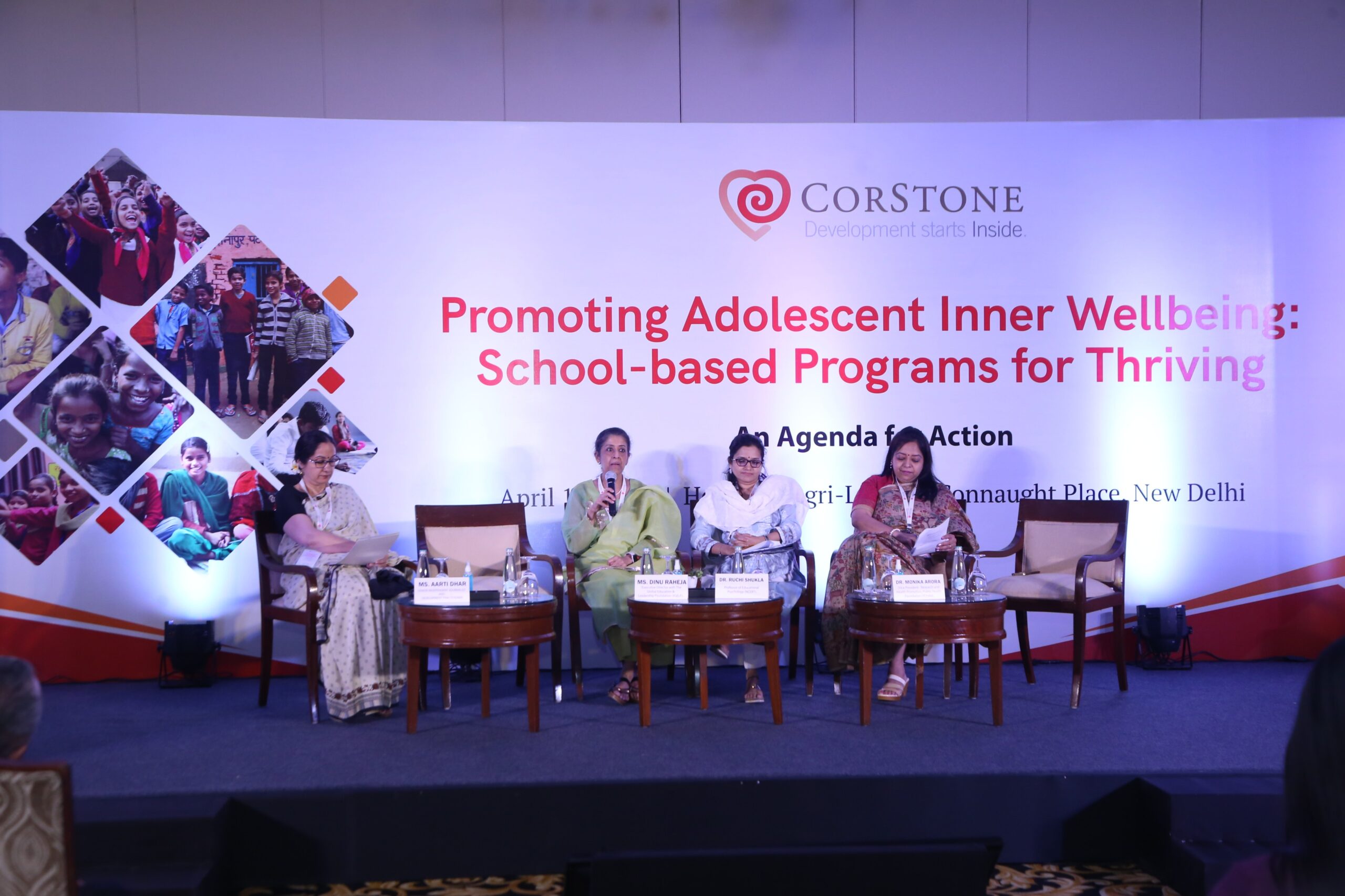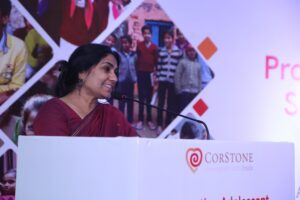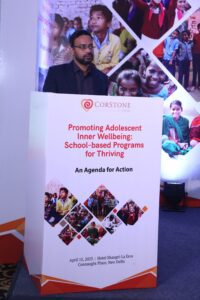
Experts discuss school-based approaches and actions needed to promote positive mental well-being outcomes for adolescents
CorStone Joins Hands with Bihar Government to Enhance Adolescent Wellbeing in the State – to reach approximately 35,000 government schools and 534 KGBVs, providing wellbeing skills to over 3.5 million Standard VI-VIII students annually
New Delhi | April 15, 2023
CorStone, a non-profit organization that works to foster inner health and wellbeing in marginalised and vulnerable youth, organized an event in Delhi today to highlight the need for immediate policy action for promoting inner well-being and health among adolescents. Their objective is to fulfil the aims of the National Education Policy (NEP), 2020 that focuses on developing individuals who possess not only cognitive abilities, but also strong character, holistic perspectives, and essential 21st century skills.
NCERT surveyed school students in 2022 about their thoughts on mental health and well-being. The survey revealed that students feel responsible for doing well in school, like school in general, but also feel anxious and have mood swings related to studies and exams, which points to the need for a holistic approach towards ensuring good mental health of school children. The conference titled “Promoting Adolescent Wellbeing in Every School: Bihar Leads the Way”, was aimed as a brainstorming session amongst policymakers, educators, and mental health experts to help device strategies to meet the urgent need.
The event had renowned speakers and participants from the Departments of Health and Education from the Government of Bihar and officials from the Union Education and Health Ministries, mental health and adolescent health experts, researchers, practitioners, Civil Society Organisations, and funding agencies. The discussion included school-based approaches and actions needed to promote positive outcomes for adolescents’ mental health.
The event also included an engaging panel discussion titled Putting schools at the core of well-being /Ensuring Schools become supportive ecosystems to foster well-being: The why and the How. Panelists included Dr. Ruchi Shukla and Dr. Sushmita Chakraborty – ManoDarpan Cell, NCERT and co-authors of the NCERT Mental Health study of School Children; Ms. Dinu Raheja – The Global Education and Leadership Foundation; and
Dr. Monika Arora – Public Health Foundation of India. The event also had an interesting session with a few students from Government schools in Bihar and their teachers speaking about their experiences of being a part of the CorStone programs.
In alignment with the Atmanirbhar Bharat Abhiyan, CorStone’s endeavours will complement Manodarpan, a program by the Ministry of Education (MoE) that seeks to offer psychosocial assistance to students, teachers, and families, promoting mental health and emotional well-being.
Delivering the keynote address at the CorStone event, Shri Sajjan R, Director – SCERT, Govt of Bihar, said, “Promoting wellbeing of students is crucial to their mental health, educational attainment and holistic development. This is also the focus of the NEP 2020. The role of schools and teachers in ensuring this cannot be emphasized enough. Resilience and wellbeing are being included in all our teacher trainings, and the first orientation of 40,000 teachers has recently been completed. We hope to reach every middle school in Bihar so that students can learn about their strengths, become resilient and stay mentally healthy in difficult times. The Department is committed to integrating wellbeing into the state training curricula and textbooks and orienting teachers in early identification and psychosocial support. We are happy to work with CorStone to ensure that this becomes a reality.”

“A crucial aspect of school-based mental health and well-being programs is sensitisation and training of teachers. I am glad to learn that CorStone’s interventions focus on the role of teachers in promoting mental wellbeing of children and adolescents”, said Ms. Urvashi Prasad, Director in the Development Monitoring and Evaluation Office, NITI Aayog.
“Since 2013, we have reached thousands of students and teachers across Bihar and documented extensive evidence that these programmes transform the emotional resilience, mental and physical wellbeing, and education outcomes of adolescents. We are very grateful to have received support from the Government of Bihar at every step of the way,” said Steve Leventhal, Chief Executive Officer, CorStone.
“I am certain that this partnership is the first step to ensuring that every student and teacher in Bihar obtains the skills and knowledge to thrive in and out of the classroom, and change their lives. We are thrilled to highlight the success of our long-standing partnership with the Bihar Education Department, and look forward to building collaborations with others to expand this work to other states in India,” adds Nandita Bhatla, Country Director, CorStone India Foundation.
In a recent development, adolescents in all Government Middle Schools and Kasturba Gandhi Balika Vidyalayas (KGBVs) in Bihar will receive a wellbeing programme through a three-year collaboration between CorStone and the Education Department, Government of Bihar. The partnership will expand CorStone’s Youth First and Girls First resilience programmes across the state in order to enhance the holistic wellbeing and development of adolescents as per the New Education Policy | NEP, 2020. Recently on December 21st, a one-day conference was organised in Patna to highlight achievements from these programmes and lay out a road map for the integration of adolescent wellbeing training into the school system.
Under the partnership, CorStone and the Education Department will work to institutionalise wellbeing training within the government structure. The CorStone curriculum will also be adapted and integrated into all school textbooks by academic year 2024. CorStone will provide curriculum, training, technical advice and monitoring support to the Education Department through 2025 to help ensure adoption and sustainability of the programmes across all 38 districts of the state. At scale, the programmes are expected to reach approximately 35,000 government schools and 534 KGBVs, providing wellbeing skills to over 3.5 million Standard VI-VIII students annually.
The Youth First and Girls First programmes integrate a resilience and adolescent health curriculum delivered through an innovative teacher-facilitated peer group model. Resilience is the ability to bounce back from adversity and thrive.
The programmes integrate evidence-based practices from the fields of emotional resilience, positive psychology, social-emotional learning, and conflict resolution with adolescent health training to improve mental and physical wellbeing, school engagement, self-advocacy, social skills and relationships among youth. First launched in India in 2009, these have been implemented in select districts in Bihar since 2013.

In Kenya, CorStone and its local partner have entered into a nationwide agreement with the Ministry of Education nationwide to roll out CorStone’s Youth First program in all middle schools across the country; 2 million children will receive the program annually.
In Rwanda, CorStone’s Youth First program will roll-out to 50% of all schools within the next 3 years. In all, over 5 million children per year in over 50,000 schools will benefit from CorStone’s wellbeing and resilience programs across India, Kenya, and Rwanda within the next 3 years.
About CorStone
CorStone is a global non-profit organisation that works ‘from the inside out’ to foster inner health and wellbeing in marginalised and vulnerable youth. CorStone’s resilience-based approach teaches the skills that empower youth to thrive—not just survive—when faced with significant adversity. Studies, including large-scale randomised controlled trials, have documented the powerful impact the organisation’s programs are having on the mental and physical wellbeing and education of youth. Founded in 1975, CorStone is headquartered in Baltimore, Maryland, USA. Its subsidiary, CorStone India Foundation, has offices in Delhi and Patna, India. To learn more, please visit CorStone online.
About Youth First and Girls First
CorStone’s Youth First programme is implemented in government middle schools while the Girls First programme is implemented in KGBVs. Youth First and Girls First provide a school-based, integrated resilience and adolescent health training, demonstrated to improve mental and physical health, school performance and engagement, self-advocacy, social skills and gender attitudes among youth. Students attend facilitated peer support groups led by trained teachers in schools and KGBVs for one hour each week over the course of a school year. A typical session combines 20-30 minutes of skill building followed by 30 minutes of group discussion and problem-solving.
Media Contacts
For US and International inquires:
Ms. Sofija Dilas
+44-75840-95977
For India only:
Ms. Bhavani Giddu
[email protected] / +91 9999500262
Ms. Nandita Bhatla, Country Director, CorStone India Foundation
[email protected] / +91-99104-83548










